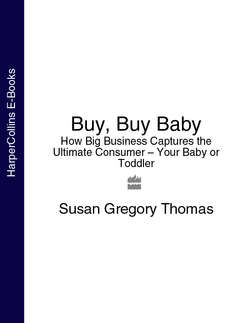Buy, Buy Baby: How Big Business Captures the Ultimate Consumer – Your Baby or Toddler

Реклама. ООО «ЛитРес», ИНН: 7719571260.
Оглавление
Susan Thomas Gregory. Buy, Buy Baby: How Big Business Captures the Ultimate Consumer – Your Baby or Toddler
Dedication
Contents
Epigraph
Introduction
1. Learn Something New Every Day
2 “There’s a New Mom in Town”
3 “It’s Like Preschool on TV”
4. A Vast and Uncontrolled Experiment
5. Elmo’s World
6. The Princess Lifestyle
7. Anything to Get Them to Read
8. Developing Character in Preschool
Conclusion: A Defense of “Nothing”
Notes
Bibliography
Acknowledgments
Index
Copyright
About the Publisher
Отрывок из книги
FOR ZUZU, FRANKIE, AND TIN
Title Page
.....
At that point in technology history, computers enjoyed a virtually unimpeachable reputation as educational instruments. The overwhelming sentiment at the time was that by using computers even for the most mundane tasks, children were not only learning a particular skill but were also becoming smarter in the process. A great many people, of great social and economic influence, seemed to believe that “kids today” were smarter because they could do things like insert a CD-ROM into the appropriate disk drive and build Web sites using HTML software. But the archaeological and anthropological record shows that children have always begun using the predominant tools of their culture at around four or five years old. Kids were no more sophisticated for using computers in Newton, Massachusetts, in the mid-nineties than for learning how to use bows and arrows in the prehistoric Lenape nation. The real change, it seemed, was the influence of marketing: people believed it.
That was certainly true for the technology industry as a whole. Ingenious marketing and public relations campaigns could take a great deal of the credit for the heady success of the tech economy of the nineties. I was especially impressed by the Palm marketing team, which did a phenomenal job of convincing not just harried dot-com CEOs but everyone else who had relied on paper datebooks that they would not be able to get organized without a hundred-dollar hand-held digital gizmo. It was common knowledge that Microsoft and Intel kept upping the ante with new versions of Windows that demanded ever-faster processors; then PR departments helped drive the fear of becoming obsolete, which accelerated the upgrade cycle. Internet providers fed concerns that if you didn’t have a Web site, you would be denied access to the digital age.
.....